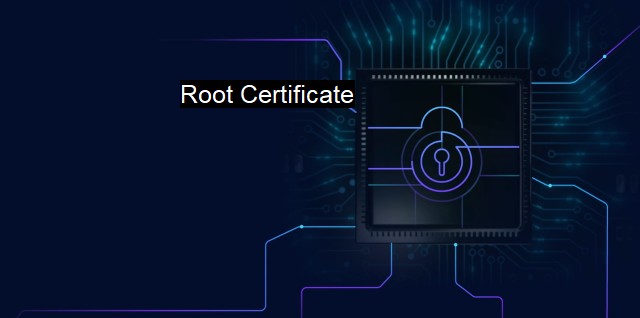What is Root Certificate?
Understanding Root Certificates in Cybersecurity and Antivirus: Ensuring Authenticity and Security of Digital Certificates with Trusted Third-Party Organizations
A root certificate is essentially a digital file embedded in computer systems, inclusive of antivirus programs as a trusted third party in cybersecurity provisions. It embodies a core element establishing the platform for secure and encrypted networks between communication systems digitally.To understand what a root certificate is, it is imperative to explore the nature of Secure Sockets Layer (SSL) certificates. The SSL certificates emerge as encryption methods designed to enhance cybersecurity by caricaturing identity confirmation and forging a platform of confidential information transference. Typical systems encompass server systems and web browsers aiming towards the establishment of encrypted and secure communication tunnels. The SSL certificates appear within different tiers under multiple issuers. Each issuer diapason possesses an anchor from a trusted source, also termed as Certificate Authorities (CAs), most notably seen in root certificates.
While functioning as the final source of trust, a root certificate arises as a self-signed certificate in the cybersecurity domain. The scope of the root certificate extends beyond the issuance of the certificate, often finding itself signed by the same entity, which is something typically unheard of within subordinate certificate handlers. Clearly this evidences its unique role and technical ontology. It manifests in a robust digital nature thereby building trust into a digital security system essence and maintaining the authentication ecosystem cohesively.
Each unique root certificate bears an identifying fingerprint. This fingerprint, made up of a distinct cryptographic hash, helps to safeguard against inadvertent modification or pernicious meddling that could compromise the trust associated with it.
From a professional cybersecurity vantage point, root certificates ensue their operations within a trust store, which is an aggregated cache of root certificates that a device instinctively trusts. This trust cements from the device manufacturer preinstalling the certificates, also the installation occurs from either a government or organization instructions advocating stringent cybersecurity.
The root certificate attains constant protections targeted from anti-virus programs wherein every certificate available does not globally function without proper signature validations, such validations being identity confirmations that license the control of a particular private key.
To utilise the concept in computer networking, understanding the chain of the trust is fundamental. The trust chain explains the hierarchical stances beginning with the root certificate, advocate generations of intermediary certificates, and cataloguing to the end-entity or leaf certificate. This chain proves instrumental in propagating trust from the root to the end-user, thereby ensuring the security and privacy of each interaction within an encrypted network.
Factoring in its pivotal role, no part in the cybersecurity landscape does the work silently and effectively, rendering it on the trusted perimeter of the secure data network. It layers antivirus platforms allowing regular computer functions remain uninterrupted whilst ensuring superior privacy and trust environment.
But they do come with inherent challenges, like the spread of rogue root certificates that can potentiate the jeopardy to cybersecurity and risk compromising encrypted communications channels. Therefore, the adverse situation is that once malware deceives the computer to accept a fraudulent root certificate, inbound traffic can then be manipulated and extra-security measures may then be required.
To summarise, where the root certificate lies, trust accompanies due to signing certificates on its own discrete hierarchy, overseeing identity confirmations and confirming the private key control. True to its essence, the root certificate belies foundational part in managing SSL certificates and wider cybersecurity trust chains, operating hand-in-hand with antivirus arrangements to ensure an optimised secure and encrypted communication ecosystem spanning internet connectivity and auxiliary digital mediums.

Root Certificate FAQs
What is a root certificate?
A root certificate is a digital certificate that is used to establish the trustworthiness of a public key infrastructure (PKI) system. It serves as a starting point for creating and validating other digital certificates.Why are root certificates important in cybersecurity?
Root certificates are crucial in cybersecurity because they ensure the security and authenticity of digital communications. They help prevent malicious actors from impersonating legitimate websites or services and protect against man-in-the-middle attacks.How are root certificates used by antivirus software?
Antivirus software uses root certificates to verify the authenticity of websites and digital certificates. It checks the root certificate chain to ensure that the certificate presented by a website is genuine and has not been tampered with. This helps protect users from phishing scams and other types of online fraud.What happens if a root certificate is compromised?
If a root certificate is compromised, it can pose a serious security threat. Malicious actors could use the certificate to create fraudulent digital certificates, making it possible to intercept and decrypt confidential communications. It could also lead to the spread of malware and other forms of cyber attacks. Therefore, it is critical to protect and regularly update root certificates.| | A | | | B | | | C | | | D | | | E | | | F | | | G | | | H | | | I | | | J | | | K | | | L | | | M | |
| | N | | | O | | | P | | | Q | | | R | | | S | | | T | | | U | | | V | | | W | | | X | | | Y | | | Z | |
| | 1 | | | 2 | | | 3 | | | 4 | | | 7 | | | 8 | | |||||||